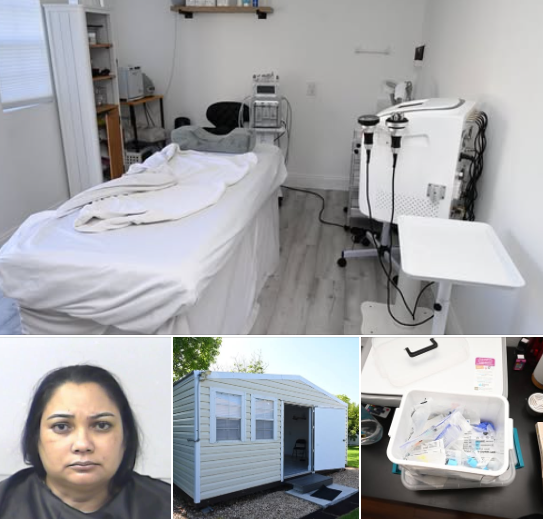In a bizarre and disturbing case that has rattled the Port St. Lucie community and sent shockwaves through Florida’s cosmetic industry, 50-year-old Rosa Mena was arrested on Wednesday for allegedly posing as a medical professional and administering unauthorized cosmetic procedures out of a makeshift “med spa” located in a shed behind her home. The arrest came after a woman who believed she had found a deal on Botox treatments ended up suffering facial paralysis—a devastating outcome that ultimately triggered the investigation into Mena’s unlicensed operation.
The allegations against Rosa Mena are both egregious and deeply unsettling. According to police reports, Mena presented herself as a qualified provider of cosmetic enhancements and operated an exam-room-like space outfitted with clinical-looking equipment in what appeared to be a carefully staged backyard facility. To the untrained eye, the setup might have seemed legitimate. But behind the veneer of professionalism, authorities say there was no medical license, no formal training, and no legal authorization to carry out the procedures she advertised.
The victim, whose identity has not been publicly disclosed, told investigators that she was initially drawn to Mena by the promise of discounted Botox injections—a bargain that seemed too good to pass up. However, the consequences were catastrophic. After undergoing treatment at Mena’s makeshift clinic, the woman began to notice facial paralysis. Hoping for a remedy, she returned to Mena for a follow-up treatment—one that failed to resolve the issue and instead compounded her suspicions. It was only then that she contacted police, prompting law enforcement to intervene.
Upon inspection, Port St. Lucie detectives found the backyard shed outfitted to resemble a medical clinic. Photographs released by the police depict an exam chair, bright lighting, cabinets stocked with syringes and other materials—all of which contributed to an illusion of credibility. But as investigators quickly confirmed, Rosa Mena had no medical certifications, no licenses, and no formal affiliation with any health agency or professional medical institution. In short, she was an impostor, allegedly injecting unverified substances into people’s faces in a setting that flouted basic health, safety, and legal standards.
Dr. Brian Hass, a respected plastic surgeon with more than 30 years of experience in Palm Beach Gardens, spoke candidly about the case. “I’m disappointed to hear it,” he said. “But it’s not shocking.” Dr. Hass has seen his share of cosmetic medicine scams, particularly in areas like Miami, but expressed concern that such dangerous impersonations are now appearing in more suburban neighborhoods like Port St. Lucie. He emphasized that real Botox treatments are expensive for a reason—because they involve trained professionals, medical-grade substances, and strict procedural oversight.
“If someone is charging you a bargain price, something’s not right,” Hass warned. He likened getting illicit cosmetic injections to fueling a luxury car with contaminated gasoline. “Just as you wouldn’t want to put bad gas in your car, you shouldn’t let anything bad go into your body,” he added.
The charges facing Rosa Mena are severe. She is currently facing three counts of aggravated battery—a charge that typically applies when someone knowingly causes serious bodily harm to another—and three counts of practicing medicine without a license, a third-degree felony in the state of Florida. If convicted, Mena could face years behind bars, as well as steep fines and restitution obligations to her victims.
Beyond the legal consequences, this case raises serious public health concerns. Unlicensed medical activity—especially involving injectables, chemicals, or surgery—can result in lifelong disfigurement, infections, nerve damage, and even death. While Mena may have styled her backyard shed to look the part, authorities note that such setups often lack sterilization protocols, medical supervision, and emergency response readiness, putting unsuspecting victims at extreme risk.
Dr. Hass urged the public to exercise extreme caution when considering cosmetic procedures. His advice? Do your homework. “Make sure that person has been well-trained,” he said. “Ask them about their credentials. How long have they been doing it? Did they just start last Tuesday? Or have they been doing it for years?” He stressed the importance of working with licensed professionals, including board-certified plastic surgeons, dermatologists, physician assistants, and nurse practitioners who operate under medical supervision.
Equally important, according to Hass, is word-of-mouth validation. “Be sensible. There’s a reason that people get that much training. There’s a reason those treatments cost what they do,” he said. The implication is clear: cutting corners in cosmetic medicine can come at a terrible personal cost.
Authorities have not yet released whether additional victims of Rosa Mena have come forward, but the possibility of more patients suffering silent injuries looms large. Police are encouraging anyone who received treatment from Mena—or who knows others who might have—to come forward immediately. The Port St. Lucie Police Department is actively seeking tips and will continue the investigation to determine how many people may have been harmed.
The case also highlights the growing prevalence of underground med spas and pop-up beauty clinics in South Florida. While such operations may advertise on social media platforms and appear affordable or accessible, they often evade regulatory scrutiny, prey on the medically uninformed, and create untraceable health risks.
In the aftermath of Mena’s arrest, public health advocates are once again urging state legislators and local law enforcement agencies to tighten oversight and increase penalties for unlicensed medical activity. There is also a renewed call for consumer education campaigns to inform the public about the dangers of accepting cosmetic procedures from non-certified individuals.
For now, Rosa Mena remains in custody. Her backyard operation has been shut down, and her story serves as a stark warning about the real-world consequences of medical impersonation in a field where reputation and regulation are a matter of life and death.

